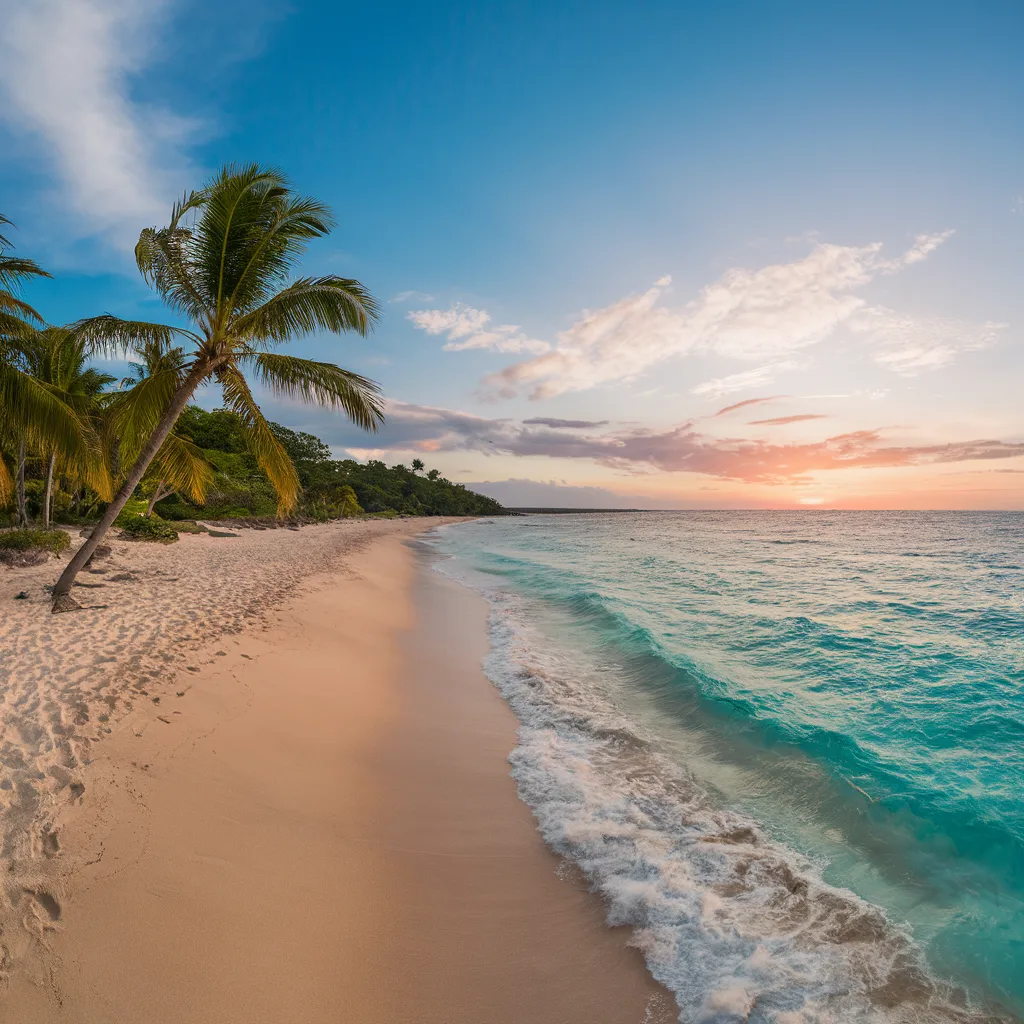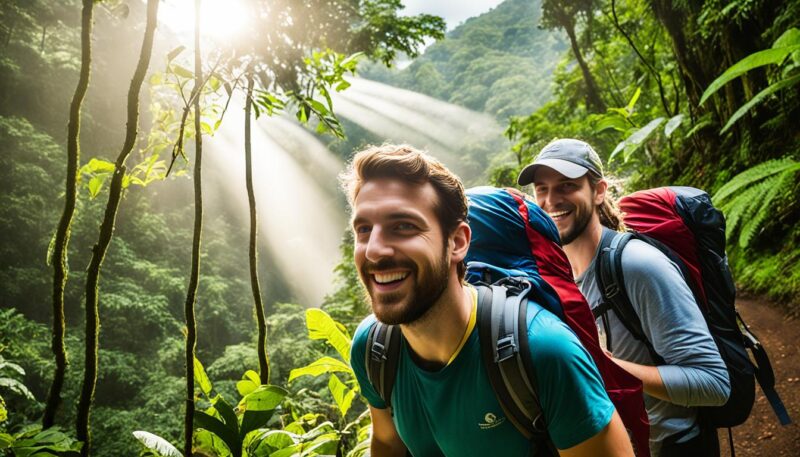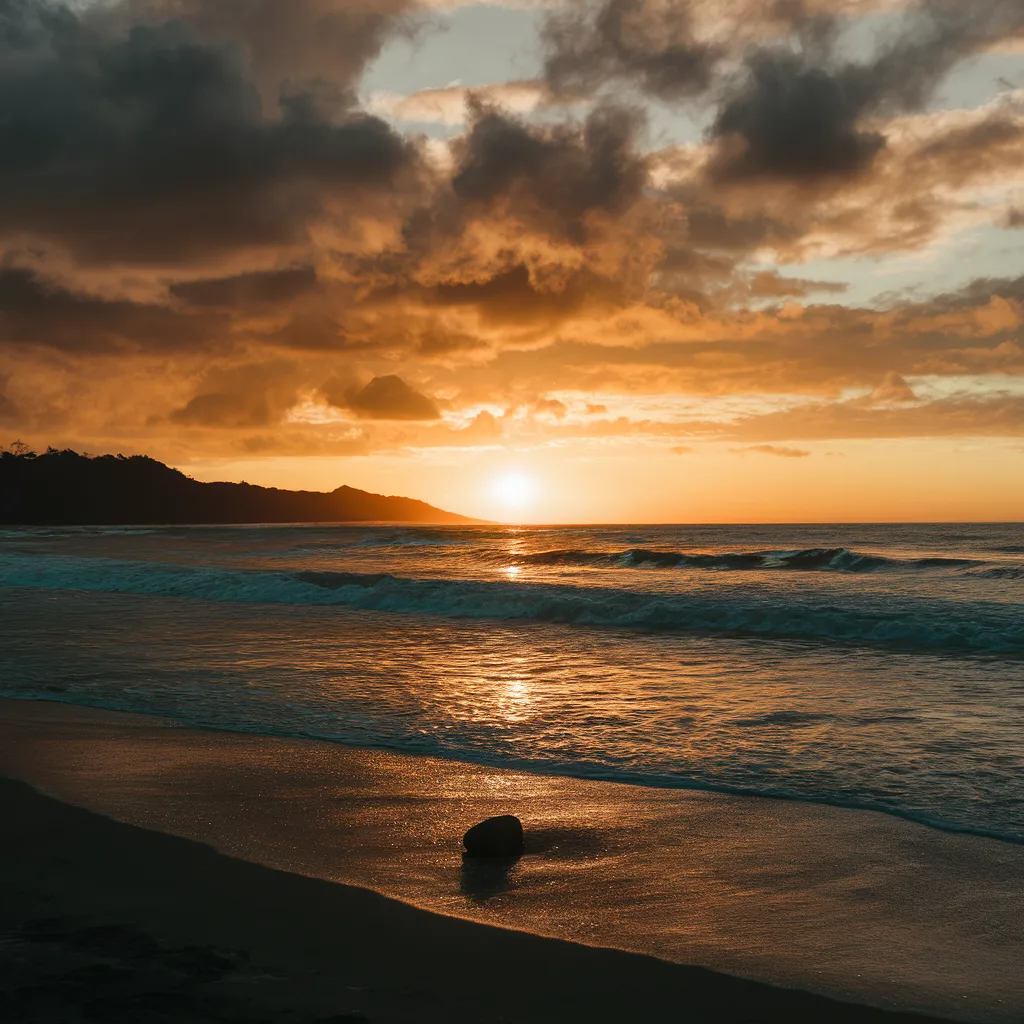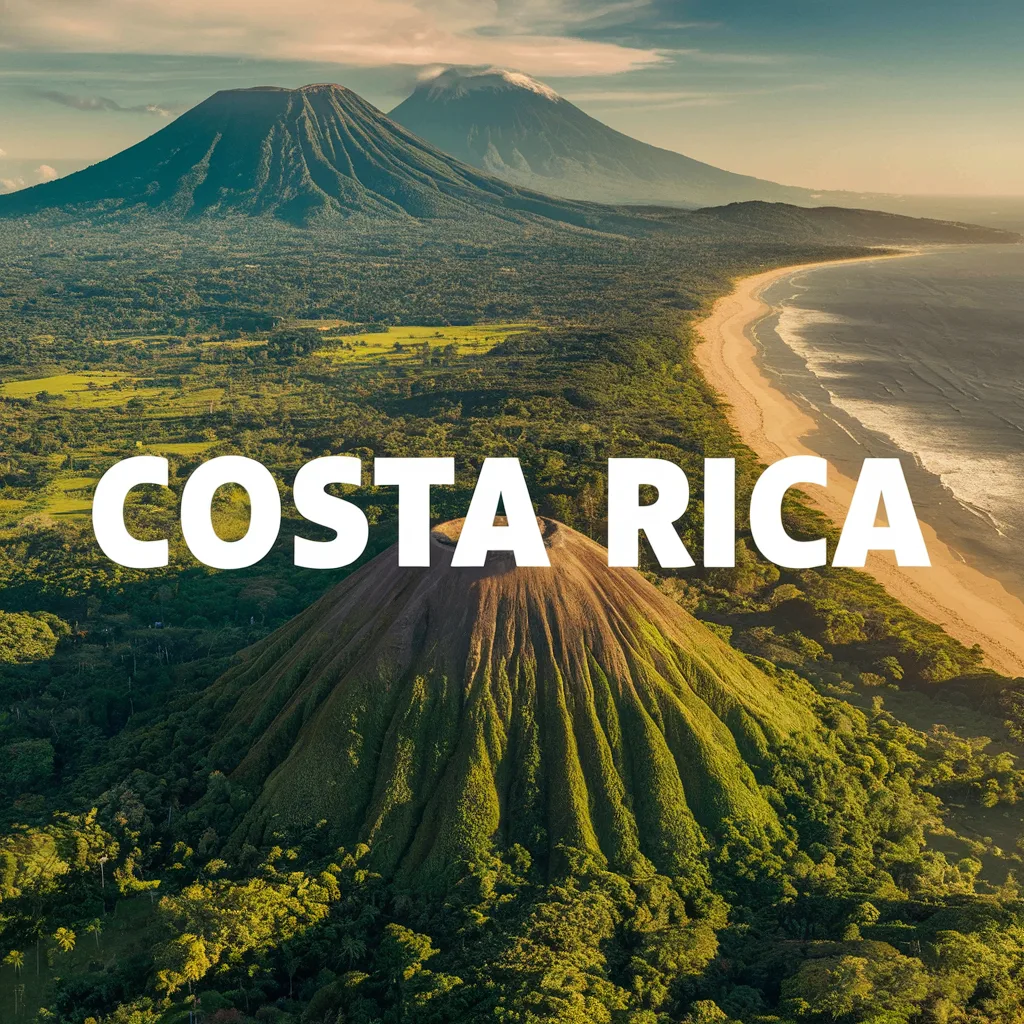Did you know that Costa Rica is now a top spot for travelers worldwide? Millions visit every year.
It is a dream for many because of its beautiful beaches, green rainforests, and interesting animals. But, not everything is as perfect as it seems.
Travelers are told to be more careful in Costa Rica because of crime. The big worry is small thefts and pickpocketing. But sadly, violent crimes like armed robberies, killings, and sexual attacks can happen too.
Key Takeaways:
- Costa Rica has become a popular travel destination, but it is important to be aware of the travel advisory.
- Petty crime, such as theft and pickpocketing, is a common issue in tourist areas.
- Violent crime, including armed robbery, homicide, and sexual assault, can also occur in Costa Rica.
- Travelers are advised to be cautious, avoid displaying signs of wealth, and enroll in the Smart Traveler Enrollment Program (STEP) for emergency alerts.
- Exercise caution when withdrawing cash from ATMs and follow the guidelines provided by the Department of State.
Crime in Costa Rica
In Costa Rica, petty crimes are a problem, like pickpocketing and purse snatching. This happens a lot in areas popular with tourists. Thieves also steal from cars and homes. They often target places where tourists stay. Car theft is common, especially with rental and luxury cars. There are also violent crimes such as murders and robberies. Some areas see more crime due to drug trafficking.
Travelers should take steps to stay safe with these tips:
- Keep your belongings safe: Watch your stuff and don’t leave it out. Put important items in a safe place.
- Avoid lonely places: Stay where there are lots of people and lights, especially at night. Don’t go by yourself in places you don’t know well.
- Use ATMs carefully: Be careful with ATMs, especially in quiet places. Pick ATMs in safe places and cover your PIN when you type it in.
Being careful and using these tips can help keep travelers safe from crime in Costa Rica.
Safety Guidelines from the Department of State
“The Department of State advises travelers to exercise increased caution when visiting Costa Rica. *Theft* and *violent crime* can occur. Travelers should be aware of their surroundings, avoid displaying signs of wealth, and enroll in the *Smart Traveler Enrollment Program (STEP)*.”
| Crime Type | Precautions |
|---|---|
| Pickpocketing and purse snatching | Keep personal belongings secure and in sight at all times. |
| Theft from cars and homes | Lock doors and windows, and take measures to secure rental accommodations or properties. |
| Car theft | Park in well-lit and secure areas, and avoid leaving valuables in the vehicle. |
| Violent crime | Stay in well-populated areas, be cautious when traveling at night, and avoid displaying signs of wealth. |
Safety Tips for Travelers in Costa Rica
Make sure to always be aware of what’s around you in Costa Rica. Following these tips will help you have a great trip while staying safe.
Avoid Walking Alone at Night
It’s best to not walk by yourself at night, especially in places you don’t know well or where it’s dark. Try to go with others or use trustworthy transportation services.
Stay Composed During Robbery Attempts
If someone tries to rob you, remember, your safety is the top priority. Stay calm, don’t fight back, and do what the robber tells you. This will help keep you safe.
Avoid Displaying Signs of Wealth
Don’t show off expensive things like fancy jewelry or tech items. Keeping these hidden can make you less of a target for thieves.
Enroll in the Smart Traveler Enrollment Program (STEP)
Signing up for the Smart Traveler Enrollment Program (STEP) helps keep you up to date with alerts. It also makes it easier to contact the U.S. embassy or consulate in emergencies.
Follow the Department of State on Social Media
By keeping up with the Department of State on Facebook and Twitter, you can get important travel advisories and safety tips for Costa Rica.
Review the Country Security Report
Look into the Country Security Report from the Department of State for detailed safety and security info in Costa Rica. It will give you advice to stay well-informed and ready.
Beach Safety in Costa Rica

Costa Rica’s beaches are beautiful, but visitors need to be careful. They should watch out for dangers and be safe. Rip currents are fast, narrow bands of water. Swimmers, especially new ones, should be careful of these.
Not all beaches in Costa Rica have lifeguards or warnings. So, it’s important to check the latest information on swimming safety. The Costa Rica Tourism Institute (ICT) and tour operators can provide the latest safety tips.
Swimming Hazards
Swimming in Costa Rica needs caution. Remember these safety tips:
- Don’t swim by yourself, especially at quiet beaches with no lifeguards or other swimmers around.
- Drinking alcohol and swimming don’t mix. It can make you less cautious and coordinated.
- Never dive into water if you don’t know how deep it is. First, make sure it’s safe to jump.
Learn the flags and signs about dangers. Always check for any posted warnings at the beach.
Image: Beach Safety Costa Rica
| Risk | Description |
|---|---|
| Rip Currents | Rapid, narrow channels of water that can pull swimmers away from the shore. |
| Unprotected Areas | Some swimming spots may lack lifeguards or warnings, making it important to stay informed. |
| Alcohol Consumption | Swimming under the influence of alcohol can impair judgment and coordination, increasing the risk of accidents. |
| Unknown Depths | Jumping or diving into water of unknown depth can lead to severe injuries. |
Travelers should always prioritize personal safety and exercise caution when enjoying Costa Rica’s picturesque beaches. By being alert, following local guidance, and respecting the power of the ocean, visitors can bask in the natural beauty while minimizing risks.
Adventure Sports and Tourism Safety in Costa Rica
Costa Rica has many thrilling adventure sports and outdoor activities for those who love adrenaline. It’s important to put safety first when enjoying these. Make sure you choose safe places for activities like kayaking, rafting, hiking, rappelling, or climbing. This means following safety tips and going with respected adventure companies.
For a safe adventure, pick adventure companies that follow the best safety rules. Find companies with great reviews that put customer safety first. Make sure their guides are experienced and ready for any problem. They should talk safety with you before you start. This gives you peace of mind.
It’s also key to check your health insurance covers sports injuries. Understand what your policy does and doesn’t cover. If it’s not enough, look into extra insurance for these activities. This can help avoid big medical bills if something happens.
Don’t do adventure sports alone. Finding a buddy or joining a group is smart. It makes these activities safer. If something goes wrong, your buddy can help or get help. This is really important.
You can also read: Is It Safe to Travel to Morocco Now?
Essential Safety Precautions
- Check for local regulations and permits required for the chosen adventure sport.
- Wear appropriate safety gear and equipment recommended for the activity.
- Stay updated on weather conditions and avoid engaging in activities during severe weather or unfavorable circumstances.
- Follow the instructions provided by your guides and pay attention to any safety briefings or training sessions.
- Carry identification documents with you at all times, including your passport or a copy of it.
By following these safety rules, you can have a great time in Costa Rica while staying safe.
| Adventure Sports Operator | Location | Services |
|---|---|---|
| Costa Rica Adventure Travel | San Jose | Offers exciting activities including rafting, ziplining, and volcano tours, with a strong focus on safety. |
| Exploradores Outdoors | La Fortuna | Specializes in adventures like canyoning, hiking, and kayaking. They have expert guides and the best equipment. |
| Desafio Adventure Company | Monteverde | This company offers bungee jumping, ATV tours, and nature trips while keeping safety a top priority. |
Before you book your adventure, do some research. Check with the Ministry of Health to find approved Adventure Sports operators in Costa Rica. This ensures you go with a trusted provider.
Safety Considerations for Students and Volunteers in Costa Rica
Student safety in Costa Rica is very important, given past incidents. It includes violent assaults, rapes, and deaths. If you’re going, whether as a student or volunteer, be careful. Choose safe organizations. Also, make sure you know about the place you’re staying and any risks.
If anything bad happens, the U.S. Embassy in Costa Rica can help. They offer medical help, help with police, and can even get you back home if needed. The embassy is a reliable source for those who have been victims of crime.
If you have concerns during your stay, you can tell the Costa Rican Tourism Commission. They can help with complaints about where you’re staying, tour companies, or anything else. It’s important to speak up to make sure your stay is safe and comfortable.
The FBI also gives good tips to stay safe in Costa Rica. Their advice is valuable for anyone traveling abroad. Make sure to consider their important safety precautions.
If a crime happens, it’s key to tell the local police right away. This helps keep the area safe for everyone. Also, letting the U.S. Embassy know after you’ve told the police can get you more help and advice.
Remember, keeping safe in Costa Rica is everyone’s job. Follow safety rules, report crimes, and ask for help when needed. By doing this, we all can have a safe and great time.
Key Safety Considerations for Students and Volunteers in Costa Rica:
- Choose organizations that prioritize safety and provide information on the area where you will be staying.
- Contact the United States Embassy for assistance in case of any unfortunate incidents.
- Register complaints with the Costa Rican Tourism Commission if necessary.
- Follow the travel tips and guidelines provided by the FBI.
- Report crimes to local police and contact the United States Embassy for further assistance.

| Safety Tips | Actions |
|---|---|
| Choose reputable organizations | Research and select organizations with a strong focus on safety and security. |
| Stay informed | Keep updated on safety guidelines, travel advisories, and local conditions. |
| Safeguard personal belongings | Avoid displaying signs of wealth and keep valuable items secured and out of sight. |
| Stay in groups | Travel with others, especially during nighttime or in unfamiliar areas. |
| Use trusted transportation | Choose reliable transportation options and avoid traveling with strangers. |
| Know emergency contact information | Keep important phone numbers on hand, including local authorities and the U.S. Embassy. |
| Follow local laws and customs | Respect the local culture and obey laws to avoid any unnecessary risks. |
Natural Disasters and Climate in Costa Rica
Costa Rica is in a place with a lot of earthquakes and volcanoes. This makes its land always changing. Lately, many of its volcanoes have been more active, making it a bit risky.
When a volcano erupts, it sends out ash. This ash can hurt people’s ability to breathe and airplanes might not fly. Everyone should check the volcano’s status and listen to advice from the park rangers and local experts.
Big earthquakes might start tsunamis at the beach. Costa Rica also has places that flood, especially when it’s the rainy season. These floods and landslides from the rain can be dangerous for visitors.
To stay safe, it’s important to keep up with the weather news. The Costa Rican National Emergency Commission and the Volcanic and Seismic Observation help with updates about the earth and volcano.
Costa Rican Geological Highlights:
| Volcanoes | Earthquakes | Flooding | Tsunamis |
|---|---|---|---|
| Poás Volcano | 5,000 earthquakes per year | Common during rainy season | Possible after significant earthquakes |
| Arenal Volcano | Located in highly active seismic zone | Mostly in Guanacaste and Limón provinces | Coastal areas at risk |
| Turrialba Volcano | Increasing volcanic activity | Risk during the rainy season | Follows significant earthquakes |
“Costa Rica’s geological landscape presents both risks and beauty. Travelers should stay informed about ongoing volcanic activity and always prioritize their safety.”
Conclusion

Always stay updated with the newest Costa Rica travel advisory news. This helps make sure your trip is both fun and safe. By being alert and following travel tips, you can lower any potential risks.
Enjoying Costa Rica involves visiting its lively cities, serene beaches, and doing exciting sports. But for a great time, it’s important to stay informed about the latest travel advice. Remember to take necessary safety steps and be ready for emergencies.
Before or during your Costa Rica trip, keep checking for travel advisory updates. Staying informed means you can enjoy the country’s beauty and culture safely. So, know the latest, be cautious, and have an unforgettable trip!
FAQ
Is Costa Rica safe for travelers?
Costa Rica is mostly safe, but travelers need to be careful. There’s a risk of petty theft and sometimes more serious crimes like armed robbery or sexual assault. Always know your surroundings and keep yourself safe.
What types of crimes should I be aware of in Costa Rica?
Pickpocketing and theft are issues, especially in tourist spots. You might hear about armed robberies and homicides in some places. Stay alert, and take steps to protect yourself and your stuff.
What safety tips should I follow when traveling in Costa Rica?
Be vigilant and avoid showing off valuables. Signing up for the Smart Traveler Enrollment Program (STEP) is a good idea for emergencies. Also, be careful when using ATMs.
Are there any safety considerations for swimming at beaches in Costa Rica?
Yes, some beaches have strong rip currents and may not have lifeguards. Check if it’s safe to swim and never go alone, especially on remote beaches. It’s also smart to avoid drinking before swimming.
What precautions should I take when participating in adventure sports in Costa Rica?
Choose tour groups known for their safety practices. Make sure your insurance covers what you’ll be doing. Always go with a buddy, and follow local rules and wear the right gear.
Are there any safety considerations for students and volunteers in Costa Rica?
There have been bad incidents in the past, like assaults and deaths. Pick groups that’ll keep you safe and in the know. If you’re a victim of crime, the U.S. Embassy can help. Report crime to the local police and get in touch with the embassy for assistance.
What should I know about natural disasters and climate in Costa Rica?
Costa Rica has earthquakes and volcanoes that can disrupt travel. Tsunamis are possible after big earthquakes. In the rainy season, there’s a risk of flooding. Stay updated on weather, follow park advice, and avoid risky areas.
How can I stay informed with the latest Costa Rica travel advisory updates?
To stay safe in Costa Rica, keep up with the news on crime, beaches, and weather. Follow safety tips and use reputable sources like the Costa Rican National Emergency Commission. This helps ensure a great, risk-free trip.
